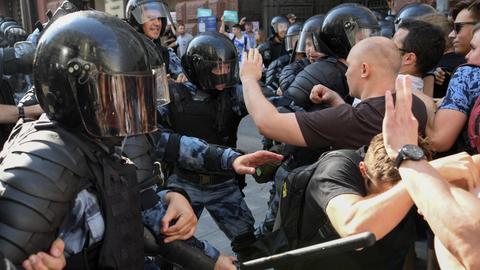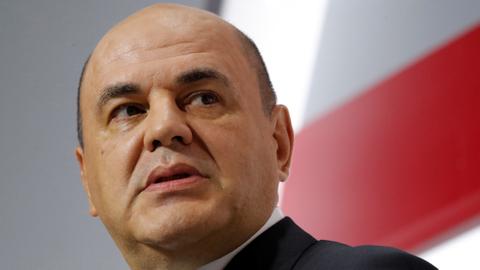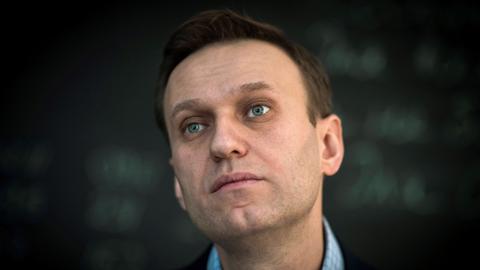Nationwide protests planned across Russia over Navalny's failing health
USEFUL IDIOT
PUTIN USES HIM TO ROUND UP THE OPPOSITION
Navalny's right-hand man Leonid Volkov says a massive rally is planned on Wednesday evening "not just about Kremlin critic's freedom, but his life" after his doctors said he could die any minute as his health deteriorates rapidly in prison.
The team of jailed Kremlin critic Alexey Navalny called for massive protests across Russia next week to help save the life of the hunger-striking opposition leader, who doctors warn could die in a matter of days.
Navalny is President Vladimir Putin's most prominent opponent and the street protests are to be held just hours after the Kremlin chief is set to deliver his long-awaited state of nation address on Wednesday.
"It's to time to act. We are talking not just about Navalny's freedom but his life," Navalny's right-hand man Leonid Volkov said on Facebook.
Volkov said Wednesday's rally, set for 7PM local time, could become a decisive battle against "absolute evil" or Russia's last opposition rally for years to come.
"Call on all your acquaintances and take to central squares," wrote Volkov, who heads Navalny's regional offices, adding that the protests should be massive.
"Don't think that nothing depends on us."
Authorities have ramped up pressure on Navalny's supporters in recent months, detaining more than 10,000 protesters at opposition demonstrations in January and February.
READ MORE: Navalny: I am being tortured with sleep deprivation in prison
US warns of 'consequences'
The 44-year-old Russian began a hunger strike on March 31 to demand proper medical treatment for back pain and numbness in his legs and hands.
On Saturday, Navalny's doctors said his health had rapidly deteriorated and demanded prison officials grant them immediate access.
"Our patient can die any minute," cardiologist Yaroslav Ashikhmin said, pointing to Navalny's high potassium levels and saying he should be moved to intensive care.
Both France and Germany on Sunday joined a growing international chorus of protest at Navalny's treatment.
US National Security Advisor Jake Sullivan warned on Sunday that Russia will face "consequences" if Navalny dies.
"In terms of the specific measures we would undertake, we are looking at a variety of different costs that we would impose, and I'm not going to telegraph that publicly at this point," Sullivan told CNN.
"But we have communicated that there will be consequences if Mr. Navalny dies."
Sullivan said the White House had told the Kremlin that Moscow would be "held accountable by the international community" for what happens to Navalny while in Russian custody.
READ MORE: Navalny ally calls for courtyard protests as Russia accuses side of treason
EU to discuss Navalny situation on Monday
EU foreign ministers will discuss the case of Navalny when they hold talks on Monday, Germany said.
"At tomorrow's Foreign Affairs Council in Brussels, EU foreign ministers will also address Navalny's situation," German Foreign Minister Heiko Maas told Bild newspaper on Sunday.
Earlier, his French counterpart Jean-Yves Le Drian also said the bloc was watching Navalny's situation closely, as he warned of possible further sanctions against Russia.
"We have already taken action," the French minister said, referring to EU sanctions.
"The package of sanctions is already significant, but there may be others," warned Le Drian.
Maas also demanded that Russian authorities give Navalny swift access to proper medical care.
"We urgently demand that Alexey Navalny receive adequate medical treatment and access to doctors he trusts," Maas told Bild.
"His right to medical care must be granted without delay."
Navalny, Putin's most prominent opponent, was arrested in January on returning to Russia from Berlin after recovering from a near-fatal poisoning attack he says was orchestrated by the Kremlin.
Moscow denies the allegation.
He is serving two-and-a-half years on old embezzlement charges, which he says are politically motivated, in a penal colony in the town of Pokrov around 100 kilometres (60 miles) east of Moscow.
READ MORE: Kremlin critic Navalny relocated to penal colony
Commentary
Navalny Persecution Just the Tip of the Russian Crackdown
Published in:Tortoise
Kenneth Roth
Executive Director
February 29, 2020.
The Kremlin undoubtedly hopes that by packing Alexei Navalny off to prison, it will keep him out of sight, out of mind. Yet Navalny’s many social-media-savvy followers make that unlikely. A growing movement of people discontented with corruption, economic stagnation, and the Kremlin’s autocratic rule means that a political opposition will persist even without Navalny.
It’s not hard to see why Navalny gets under Vladimir Putin’s skin. Navalny’s support was once said to extend no further than the intelligentsia of Moscow and St Petersburg, but he eventually built a movement across the country. Last summer while he was visiting supporters in distant Siberia, the Federal Security Service (FSB), the KGB’s main successor, apparently tried to kill him.
Over the years, the Kremlin has built a simulated democracy with a series of ersatz-opposition parties while barring Navalny’s party and impeding others. Navalny counter-attacked by encouraging the public to vote for candidates from these pseudo-opposition parties in lieu of candidates from the ruling United Russia.
The Kremlin tries to manage information and manipulate the public mood by controlling television and other mainstream media. Navalny sidestepped them by producing slick documentaries and posting them on YouTube. His latest, “Putin’s Palace,” alleges that an enormous estate has been built for the Russian president with the fruits of corruption. It has been viewed more than 100 million times.
The FSB’s apparent attempt to kill Navalny with a Novichok nerve agent, and then the Kremlin’s arrest of Navalny after he returned to Moscow for violating his parole agreement while getting medical treatment in Germany, boosted his profile across the country. And it galvanized many Russians to air a host of grievances regardless of whether they support Navalny. Meanwhile, no one has been prosecuted for the attempted murder of Navalny.
The drama surrounding Navalny and the protests it has sparked understandably have grabbed headlines. Yet a less visible battle for human rights and democracy in Russia extends well beyond Navalny, as illustrated by the broad range of people and organizations now targeted by the Kremlin.
Polls in Russia show that President Putin has widespread support, but the Kremlin has its reasons to worry. The economy is stagnating. The easy growth in income and prospects that followed the chaotic 1990s are a distant memory. The oligarchs around Putin are doing well, but most Russians are not.
Russia’s seizure of Crimea from Ukraine appealed to nationalist sentiments, but that effect is fading. Coupled with Russia’s intervention in eastern Ukraine, it has left the Kremlin stuck with an economically challenged region and sanctions imposed by the European Union and the United States.
No wonder there has been an outpouring of discontent, criticism, and protests. The Kremlin is responding with increasingly harsh tactics—most recently a spate of repressive laws adopted in late 2020.
One new law expands the charge of “foreign agent”—which in Russia has connotations of being a spy or traitor—to virtually anyone who criticizes the government and receives any amount of foreign funding or other forms of non-financial support. “Foreign agent” legislation is so toxic that it has forced dozens of groups to shut down.
Reinforced by new amendments, the law is now also being used to stigmatize opposition candidates who receive “methodological or organizational support” from abroad, whatever that means. With comparable malleability, the law also applies to journalists who are deemed to be carrying out “political activities” while “acting in the interests of” an international or foreign organization.
The government can simply ban foreign organizations operating in Russia by labeling them “undesirable” on vague security grounds.
New laws add to already-excessive restrictions on freedom of assembly—for example, by expanding the burdens placed on organizers and then requiring prior authorization even for a series of single-person protests—a tactic that had been used to evade those restrictions.
In late January and early February, Russian authorities detained more than 10,000 peaceful protesters across the country. The detentions were often accompanied by police brutality, baseless criminal charges, and unfair trials.
Unsurprisingly, given critics’ increasing use of on-line communication, the government has curbed rights in the digital domain, most recently by blocking content it considers to be calling for unauthorized protests and fining and jailing people for allegedly making such posts.
In short, a political struggle is underway in Russia of which Navalny is only the most visible part. The authorities have imprisoned him because he has proven an effective spokesman for public discontent with the Kremlin’s rule, but they are also imposing a wide array of tripwires and penalties to prevent people from airing grievances.
So as the world presses the Kremlin to release Navalny and to investigate his attempted murder, it should also push for lifting stifling restrictions on fundamental freedoms. That is the only hope for the Russian people to have a say in how they are governed.
ALI VELSHI
Russian opposition politician urges U.S. & Western nations “to stop being complicit”
Vladimir Kara-Murza, a twice-poisoned Russian opposition politician and Vice President of the Free Russia Foundation, joins Ali Velshi to discuss the escalating tensions between Russia and the United States after Biden announced new sanctions. Fresh off his latest arrest in Russia, Kara-Murza says the United States and other Western nations must “stop being enablers of Putin” and remember the Kremlin doesn’t reflect the will of the Russian people.



No comments:
Post a Comment